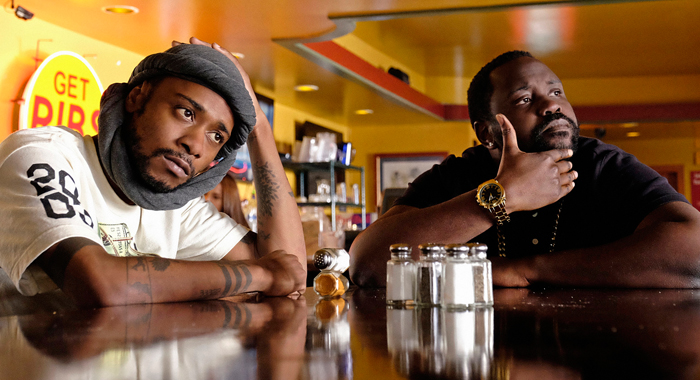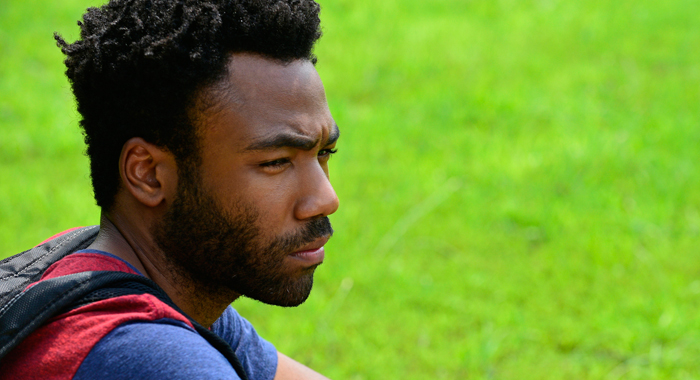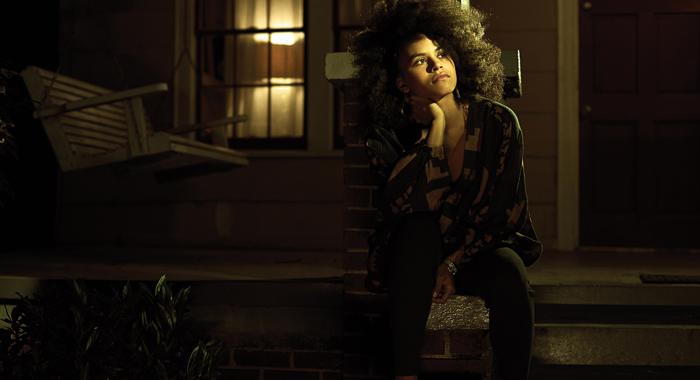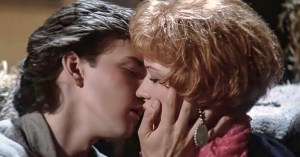ATLiens: Donald Glover Explains 10 Big Ideas Behind Atlanta
Creator, producer, and star Donald Glover offers some insights into the making of his unique new FX series.

Donald Glover’s fans have been waiting a long time to see the first TV series he created himself. FX announced their deal with Glover to develop the series Atlanta three years ago. Whatever anyone may have been expecting, Glover was determined to make Atlanta unlike any other show on television. While discussing the show with reporters of the Television Critics Association, Glover made it clear that there’s no formula to an episode of Atlanta. You’ll just have to go with him.
Fans may know Glover from his Community character Troy Barnes, his standup comedy, or his rap music under the name of Childhish Gambino. On Atlanta he plays Earn Marks, a local manager trying to promote the rap career of his cousin Alfred Miles (Brian Tyree Henry). Early episodes find them spending a night in jail, seeing what it’s really like on the streets of Atlanta, or whimsically searching for some glowing chicken wings. Atlanta premieres Tuesday, September 6 at 10 p.m. on FX.
1. There Is No “Clapter” on Atlanta
Atlanta tackles some serious issues. For example, when Earn is in jail, he meets an inmate who clearly needs mental care, but repeatedly ends up in prison instead. However, Glover insists there will be no “very special episodes.” Atlanta is a comedy, and having a message is just a byproduct of good jokes. Glover called out the trend of “clapter,” making jokes to get applause from audiences who agree with you.
“Our job on that show is to be funny first and foremost,” Glover said. “I never really wanted to make a message. One thing I think is really wack is when shows come out and they try and be important. I do not want this show to be like, ‘This is a very important show.’ I f—ing hate clapter. I think it’s wack. Leslie Jones was talking about this. ‘Make me laugh.’ That’s better and harder, I think. I hope people are able to converse with each other about the stuff that’s going on. I hope it’s funny, first and foremost, but I just hope people talk to each other about it, because that’s what’s going to change things. We all know what’s wrong and what’s right. Everybody’s known that since they were five, but adults still do wrong things all the time. I think it’s important that we just talk about why those wrong things happen. Are there systems in place that need to change so those things don’t happen as easily?”
2. Atlanta Offers a Fresh Perspective
Atlanta may seem like a unique show, even by FX’s standards — it’s the network that brought us Louie, after all. And like Louis C.K., Glover can be similarly introspective or abstract. To him, this is not a strange new vision. He just has a voice that hasn’t had a forum before.
“Comedy is based in point of view,” Glover said. “All the interesting points of view are coming from people who were marginalized for a long time. You get a different point of view from somebody. I think it’s a time where it’s easier to make content and everybody needs content really, really bad. What’s interesting to people is stuff they’ve never seen before, and comedy is a painless way of getting to touch all that stuff. Seeing a documentary about it, usually people are like, ‘I don’t want to be sad.’ It’s easy to talk about stuff because pamphlets do that, but I’ve never been like, ‘I’m gonna read that pamphlet again. That s— was hilarious.’”
3. Atlanta Isn’t Just a “Black” Show

Atlanta has an all African-American cast (Glover, Henry, Lakeith Stanfield, and Zazie Beetz), but Glover doesn’t want to talk about diversity. The press has certainly been talking about it, whether praising series representing different nationalities or chastising networks for having too many Caucasian-led shows. Glover doesn’t want to make a great “black show.” He wants to make a great show, period.
“I’m kind of done with diversity,” Glover said. “It feels like how tolerance sounded 10 years ago when people were like, ‘We need to be more tolerant.’ It’s like what the f— do you mean? Allow cool s— to be made. There’s cool s— out there. I feel like it’s up to us. I know a lot of black writers and producers and directors and stuff like that who are learning. Oh, you make something cool for no money, people pay attention to it. It’s up to us to congregate and make things. I’m not out here trying to be like, ‘Let’s make diversity.’ The worst thing in the world to me is: ‘Oh, that’s really good for an indie movie.’ Or , ‘That’s really good for a black show.’ Or, ‘That’s really good for a gay show.’ I think that’s wack.”
4. It Is About Identifying With African-Americans
One reason Atlanta may feel different from other shows is that it captures a point of view unfamiliar to many viewers. It’s one thing to watch a show starring an all African-American cast. It’s quite another to try and understand what they feel. That’s Glover’s goal.
“The thesis with the show was kind of to show people how it felt to be black,” Glover said. “You can’t really write that down. You kind of have to feel it. So the tonal aspect was really important to me. I always want people to be scared, because that’s how it kind of feels to be black. There are awesome things going on here, but it can be taken away at any moment. So enjoy it in the moment.”
5. The Weird Details Make the Show More Relatable
Atlanta definitely leans into the surreal. One example is a plate of chicken wings that glows like the ambiguous briefcase in Pulp Fiction. Little touches like that aren’t about what race you are or what city you live in.
“There really isn’t a limit to how abstract you can get as long as you believe it,” Glover said. “There has to be some sort of grounded nature to something so people don’t start being like, ‘I don’t believe this,’ and then they turn the channel. I think if you have something that is grounded on some level, you can go anywhere. People want to go there with you if you do, but you just have to have it so people are guided by their own rules every step of the way. That’s what we kind of learned, I guess, around the fifth episode or something like that.”
6. It’s Not The Childish Gambino Story

They say “write what you know,” and Glover knows about rap, but he didn’t want to play the rapper himself. He wanted to be able to talk about hip-hop without being too self-referential.
“[I’m not playing a rapper] because that would be weird,” Glover said. “Like, that would be so weird. I wouldn’t have enjoyed that. It’s possible to do that, but then it actually makes it harder for me to do. It just clouds a lot of things. I think it just wouldn’t be as much fun. Like, if David Bowie made a show about him being a rock star, you could definitely watch it, but then there’s some times you’d be like, ‘Is this dude playing me a little bit? Like, what’s going on?’ There’s a level of magic realism and suspended disbelief that you need for all genres, and it’s important to me, as an artist, to keep those intact.”
7. It’s Not Empire
You’ll see a few rappers on Atlanta and stories that take place in the music world, but it won’t feature big name cameos or lots of musical performances. Glover says there’s already a show on TV doing that.
“There’s some local people that I was excited [to have on the show],” Glover said. “People have approached me, but it’s a dangerous time to be doing that, I feel like. I didn’t want people to catch the vibe of ‘Oh, this will be like Empire’ because Empire is doing a very specific thing. I feel like it’s very easy for people to connect them because there are similar themes in them. So I wanted to make sure that it was a little different. But, yeah, there’s a lot of really cool rappers that have approached me, and I just want to make sure we use them the right way because rappers are like wrestlers. You have to be able to use them in the perfect way.”
8. Atlanta Asks The Questions You Don’t Know You Should Be Asking
So far we’ve dealt with important issues, calling out “diversity” talks, surreal visions, rap music, and experiencing how it feels to be black. There’s probably no way for an article to fully encapsulate everything Glover is trying to accomplish with Atlanta, but one thing we can say is he wants you to ask questions. People won’t ask questions until hey learn they don’t know everything.
“Life has more questions than answers,” Glover said. “Millennials feel like they know everything because they’ve got phones up the ass. So, you can answer a question, but you can’t get the answers to questions that you really want out of Google. So I kind of built a world on questions, which is everything that we have. It’s more questions than answers, I think.”
9. It’s Not All About Donald

Glover created, produced, stars in, and even directed some episodes of Atlanta. However it is not the Donald Glover show. He created roles for a great ensemble of characters, many of whom will get their own episodes in the first season.
“I directed an episode that was Zazie’s character, Van-centric,” Glover said. “It was so much fun just because I was like, ‘Can you pull that off? Oh, you can pull that off? Oh, you did it better than I expected,’ every step of the way. I don’t think we ever tried to force people to see this point of view. I was just like, ‘Okay, we are in Atlanta. Let’s just try and make the world feel big and like it feels like you are in it.’”
10. If You Don’t Get It, That’s Okay Too
Glover has faced confusion every time he tried something new in his career. He got famous on the pop culture obsessed show Community. Then when he introduced his rap music as Childish Gambino, some Community fans didn’t get it. Then he did drama. So Glover welcomes a little confusion over Atlanta.
“Some of them will be like, ‘Oh, that’s cool,’” he said. “Some of them will be like, ‘I hate this thing. I don’t get him.’ That happens a lot. I think people are always like, ‘I don’t get this guy. I don’t understand him.’ And that’s, I think, good. I think that’s really good, actually.”
Atlanta premieres on FX on Tuesday, September 6 at 10 p.m. Read reviews here.





